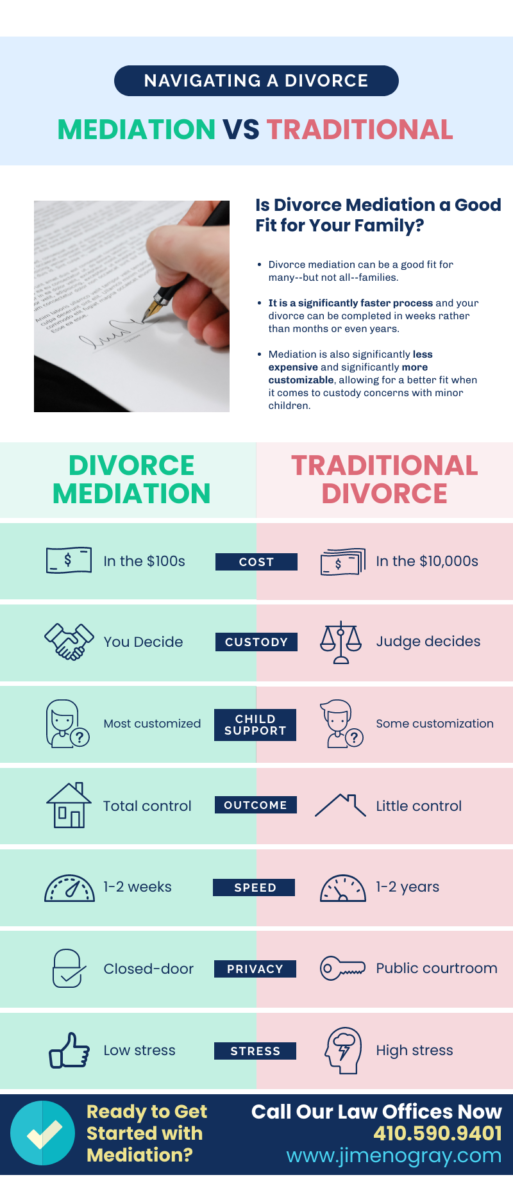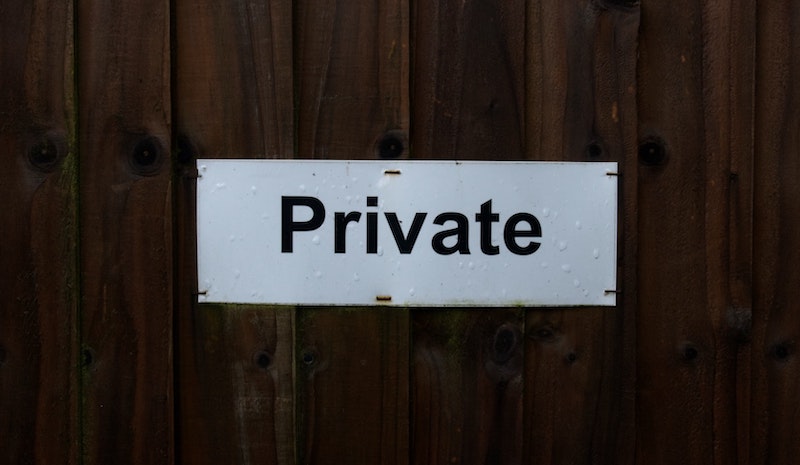Complete Guide to the Divorce Mediation Process in Maryland
What To Expect in the Divorce Mediation Process in Maryland
Divorce mediation is a conversation between you and your spouse that is guided by a neutral, third-party professional called a mediator.
Divorce mediation centers around the topics that are most important to you.
Successful mediations have a civil, collaborative tone. The goal of mediation is to identify problems, exchange and discuss solutions, and find comfort level for both you and for your spouse. If you live in Maryland, you should consider the pros and cons of mediation before settling on your path forward, which we’ll discuss below.
This convenient chart below will quickly help you understand key differences between a traditional divorce and divorce mediation:

Who Are Divorce Mediators and What Are Their Credentials?

Mediation is more successful when the mediator is an experienced divorce lawyer. Experienced trial lawyers know what the court can do, what the court cannot do, and what the court is likely to do for (or to) your family.
An experienced divorce mediator can identify solutions to problems by drawing on their decades of experience working with divorcing families in identifying solutions to a family’s problems that would not come to mind for parents who have not been through the experience previously.
A Mediator Helps Create a Customized Plan with You
An experienced mediator can also draw upon their experience to point out foreseeable problem areas so you can discuss how to react to those friction points when they occur.

Mediation is also an opportunity to customize your outcome and to agree on things that a Maryland divorce court cannot order. In other words, while a judge will have limited options after a divorce trial, you have unlimited options in mediation.
Unlike a trial in front of a judge, you get to decide what the most important issues are to you, and you are not limited by the courtrooms rules like a judge will be.
In the video below, I talk through a few more common reasons to choose mediation over a traditional divorce. It won’t be right for everyone, so be sure to consider what it could do in your specific case.
Click above to watch a quick video outlining 5 reasons to choose mediation to resolve your divorce issues.
Traditional Divorce vs Divorce Mediation: How Are They Different?
Divorce trials are public. Mediation is completely private, and the conversations confidential.

Normally, mediators spend time with both spouses together, and spend time with each spouse individually. This individual time is called a “caucus”, and gives the conversation more privacy so that both the mediator and the spouse can be unguarded and more candid about what they are thinking and feeling.
Mediation Allows for Flexibility and Options
Mediation is about exploring options. Some of these options will be very comfortable, and some will seem uncomfortable and may require some thought or even some homework.

Mediation is not a single conversation, it is a layering process that involves multiple conversations. Sometimes the participants even agree to try something on a temporary basis to see how it works, and then come back after giving it a try. Sometimes one or both participants need to research something, meaning to do some homework or to get more information, before an agreement can be reached.
What Will We Discuss In Divorce Mediation Sessions?
In general terms, you will discuss the issues that are most important to you.

If you have minor children, here is a checklist of issues that will need to be addressed:
1. Physical custody and access.
- How often will each parent see their children
- What is the holiday schedule
- What is the vacation schedule
- Is there a different access schedule for the school year vs. the summer
- Where will the transitions occur
- Who has the obligation to transport the children to exchanges, and their extracurricular activities
2. Legal custody
- Who will have the authority to decide where the children go to school
- Who will decide questions about medical care: both physical health and mental health
- Who will decide what religion the children practice
- Who will decide what extracurriculars the children are enrolled in (and how does that effect each parents’ time with the children)
- If there is a disagreement between the parents about one of these issues, what is the process for breaking the tie and making a decision
Custody is a huge part of any divorce involving families with minor children. Do your homework and be sure to understand different types of custody in Maryland. The video below will help.
Click above to watch a video outlining the difference between physical and legal custody for minor children.
3. Child support
- Do the Maryland Child Support Guidelines apply to your family?
- Will the court allow you to agree to deviate from the Maryland Child Support Guideline?
- How often is child support paid?
4. Who gets the federal and state tax benefits of raising children
5. Is one parent going to get use and possession of a house or a car for some period of time for the benefit of the children
6. Who carries the children on their health insurance
7. How are uninsured medical expenses paid
8. How are the expenses associated with extracurriculars paid
9. When should children get cell phones and what kind of access to social media should they have (or not have)
10. Does either parent have an obligation to support their children if they attend college
For your divorce, we need to discuss:
- How will a divorce will happen
- Who will file the paperwork
- What will the reason for the divorce be (also called the cause of action)
- Is there an advantage to waiting to get divorced to take advantage of the current health insurance or a tax situation
- If there is a written agreement, who will bear the cost of getting it drafted
- Who has to attend the final divorce hearing
When filing your divorce paperwork in Maryland, you need to be very specific about your cause of action, otherwise the courts won’t accept it. The video below on causes of action for divorce in MD will explain the valid—and invalid reasons for filing for divorce.
Click above to watch a video outlining the different reasons to get divorced in the state of Maryland.
- Marital property
- How will marital property be divided
- If marital property is going to be sold, how will it be sold and how will the proceeds be divided
- What happens to retirement assets and pension accounts
- What happens to joint bank accounts
- What do we do with joint credit cards and credit card debt
- Is either spouse liable for the credit card or medical debt of the other spouse
- What happens to property titled in both names
- What happens to property titled in just one of your names
- Are there any credits for non-marital contributions
- Alimony
- Is one of you going to support the other for a period of time
- If alimony is going to be paid, how much and for how long
- What are the circumstances alimony will change (for example goes it automatically go down every year, or cut off if the receiving spouse gets a better job or graduate school)
- Is it modifiable in the future by a court, or is it set in stone
- If you are going to continue to own property together after the divorce, what will the terms be
Lastly, mediation is most successful when both parties fit certain criteria and are willing to work toward a solution. The video below explains the some strategies and tips for getting the most out of your sessions with a divorce mediator.
Maryland Divorce Mediation FAQ
Below are some of the most common questions we get when discussing divorce mediation vs traditional divorce to our clients here in Maryland. If you have further questions, be sure to download our mediation guide, explore our YouTube playlist of divorce and mediation videos, and call our law office. We’re here to help.
Do I have more control in mediation than if I let a judge decide my case?
Judges listen to evidence presented during a trial and make a decision that decides the next part of your life. The evidence a judge considers in a trial is filtered by the Maryland Rules of Evidence.

At the end of a trial, a judge makes a decision about all the issues. In other words, that judge control what happens to you and your family. In reality, they have forms they fill out about children and financial issues, and there are certain things they are not permitted to do.
Common areas people can agree to outcomes in mediation that are more flexible than a judge can award:
- College expenses for your children
- Health insurance and uninsured medical expenses for your children even after they turn 18
- Apportioning car insurance for minor or adult children
- Agreeing to own a jointly owned home together for several years after the divorce (and maybe even having an agreement in place on when the home will be sold and how the proceeds will be divided)
- An agreement to pay certain expenses after the divorce on behalf of the other spouse (instead of alimony, which is a number set in stone)
- Agreeing on future estate planning so your children receive your wealth at your death
How should I prepare for mediation?

You will get out of mediation what you put into it.
- Prepare your mindset.
- Listen / try to understand the other side’s perspective
- This may be your only chance to ask questions and get unfiltered answers
- Remember that mediation is a collaborative effort, it is not a competition
- Organize your own thoughts, and know what is most important to you
- Do a little research on your own or with the assistance of a Maryland divorce lawyer to understand the terminology of divorce law.
- Get an idea of what your best and worse case scenarios would be if you went to court and let a random judge decide your family’s outcome. This will help bracket what is at stake for you and for your family. The best and worst alternatives to a negotiated agreement. There is a difference between possible outcomes, and probable outcomes; you should know both.
- Get an estimate of what the cost of litigation would be financially for your family.
- Know your family’s obstacles from past experience.
- If you are going to be discussing money issues (child support, alimony, dividing up marital property) organize yourself: know your income, what assets exist, and what those assets are worth.
- Do not assume anything going into the mediation. What is most important to you may not be what is important to your spouse. By way of example, some people want to walk out he marriage with more of their share in tax-deferred retirement assets, while their spouse may want to keep the family house.
How much faster is mediation than divorce litigation?
Watch the video below for more on the divorce process in Maryland, and how your case would move through the court system.
In a contested case the tempo looks like this:
- The Plaintiff drafts a Complaint for Divorce.
- The Plaintiff files it with the court.
- The Clerk of the Court sends the Plaintiff a Writ of Summons to be served on the Defendant.
- The Plaintiff has the Defendant served. The Defendant has 30 days to file a response (assuming they are served in the state of Maryland).
- After the Court receives the Defendant’s Answer, they review it and set the case in for a Scheduling Conference.
- At the scheduling conference, the initial calendaring for the case is set:
- A Pendente Lite Hearing is scheduled
- A Discovery period is set to allow Interrogatories, Requests for Documents, Subpoenas for documents, and depositions to occur
- A Pretrial conference is set
- At the pretrial conference, if the case is not resolved, a trial date is set. A trial can range from a few hours to several weeks.
Typically this process takes somewhere between 10-24 months, depending on how complicated the issues are and how well everyone works together.
A typical divorce mediation timeline:
- Someone calls and sets a mediation appointment.
- The mediator’s office email the agreement to mediate and confidential questionnaires.
Mediation is typically scheduled and concluded within 2-4 weeks.
How much cheaper is mediation than divorce litigation?

Mediation is far cheaper than contested divorce litigation. In mediation, you pay the mediator’s fee, which is usually their hourly billable rate. Mediation normally takes 2-6 hours of he mediator’s time.
In divorce litigation you are paying their hourly rate, but between the travel, preparing the paperwork, the legal research, depositions, conferences, and preparing for a contested trial, you will potentially pay for hundreds of hours of their time: to get an uncertain result.
Remember that mediation is a faster, less expensive way for you to regain control of your life.
The sooner you take control, the sooner you move in the direction you want your life to move.
Ready for the Next Step?
Call our law firm now at 410.590.9401 to learn more about Divorce Mediation and traditional divorce services we offer for families in Maryland. Or, click below to download our guide to Maryland divorce.
Meet Our Team

Gregory P. Jimeno, Esquire
Partner

Frank C. Gray, Jr., Esquire.
Partner

Magaly Delisse Bittner, Esquire
Partner

Jessica McConnell, Esquire
Associate

Lisa Eckstorm
Office Manager and Funding Coordinator

Alex Avioli-Bent
Paralegal

Erin Finn
Paralegal

Karen Nolasco
Paralegal

Robyn Youssef
Intake Specialist


